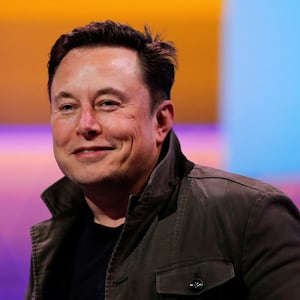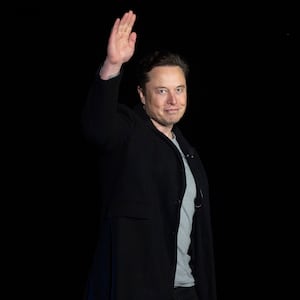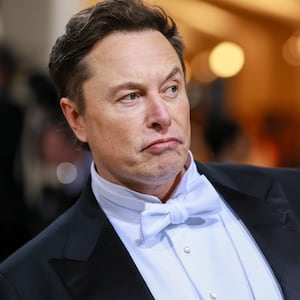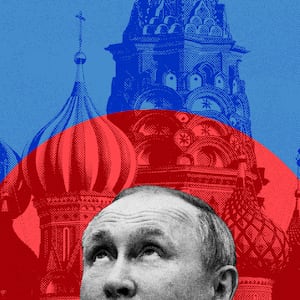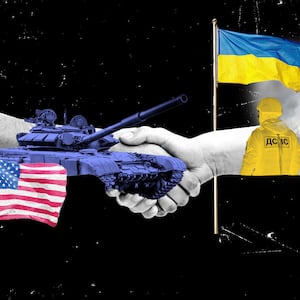Good news, everyone! Elon Musk and his friends have solved the Ukraine war. Or so they (and their Twitter hive) say.
Musk, the richest person on Earth (except, perhaps, Russian leader Vladimir Putin, whose wealth is mostly hidden) announced earlier this month a plan for peace: Russia keeps Crimea, which it took from Ukraine in 2014. The sham referendums Russia used as a pretext to annex parts of eastern Ukraine are redone “under UN supervision” and everyone honors the results. Ukraine “remains neutral” (i.e. promises to never join NATO and possibly the EU).
National security and international relations experts criticized this plan as unrealistic and too favorable to Russia. Why should Ukraine make big concessions while its military is gaining ground? Why should Russia be rewarded for its failing invasion and give nothing in a peace deal except a promise to stop massacring Ukrainians? Why would Ukraine believe Russia’s promise when Putin has broken similar promises before, and why would anyone trust Russia to allow a free and fair referendum, or honor it if they don’t like the results?
ADVERTISEMENT
Musk hasn’t tackled those questions, instead defending his proposal as “highly likely to be the outcome in the end” so it’s “just a question of how many die before then.”
It’s not likely, let alone highly, but that assertion of inevitability—one that others are too ideological, myopic, or bloodthirsty to recognize—is essential to his plan. The most vocal proponent of this argument is probably tech investor David Sacks, the founding COO of PayPal and a current shareholder of Musk’s company SpaceX. Here’s how he put it in a tweet:
The problem here is not just that all three of his hypothesized outcomes are conceptually flawed, nor that it’s a false choice, leaving off more likely possibilities. The entire approach of envisioning endstates, picking ones that sound fair to you, and declaring that something like it is inevitable displays a deep misunderstanding of international relations and war.
Things are changing too quickly, there are too many moving parts, and momentum can shift dramatically. A lot is unpredictable. We don’t know what things will look like on the battlefield a few months from now, so even if we can imagine the details of a desirable endstate, we can’t know if it’s possible, let alone how to get there.

Firefighters extinguish a fire inside a residential building that was hit by a missile on Feb. 25, 2022, in Kyiv, Ukraine.
Pierre Crom/GettyAt the start, a quick Russian victory was supposedly inevitable, and international security analysts worried about a prolonged insurgency. Then Ukraine held together and repelled the assault on Kyiv, Russia shifted to a slower, grinding advance in the south and east, and the so-called “pro-peace” argument was that Russia taking and holding that land was inevitable, so Ukraine should concede it to them to avoid unnecessary bloodshed. But then Ukrainian counteroffensives retook a lot of territory, so now the supposed inevitability, the one that says Ukraine should give Russia concessions, is that Russia will launch nuclear weapons if they don’t.
Except that’s not close to inevitable, either.
Russian nuclear capabilities are checked by deterrence, same as always. The argument that the U.S. should push Ukraine to make concessions in the face of Russian nuclear threats is that Putin will do something drastic if he’s “losing everything.” That’s a real risk, but “losing everything” looks like a radioactive crater where Moscow now stands, not merely failing to conquer Ukrainian territory. Russia using a nuclear weapon likely prompts conventional U.S. military strikes, and shunning by China and India, plus risks a spiral to full on nuclear war. All nuclear powers involved in Ukraine have shown respect for Mutual Assured Destruction, with the U.S., U.K., and France keeping their own forces, and some of their most advanced equipment, out of the war—as well as Russia refraining from targeting arms shipments outside of Ukrainian territory.
It’s not impossible that Putin will take that terrible gamble, but it’s not likely, and giving in to nuclear extortion would show that the threat works, thereby encouraging more.
There’s no reason to think Putin would react to achieving some, but not all, of his war aims by saying, “Thank you, I’m satisfied, we’ll totally respect Ukraine and everyone else’s independence from now on.” More likely he’d reconsolidate Russia’s strained military and try to intimidate or conquer neighbors again, knowing the U.S. will push for concessions should Russia threaten to use nukes.

Ukrainian servicemen ride on tanks toward the front line in the Lugansk region of Ukraine on Feb. 25, 2022.
Anatolii Stepanov/AFP via GettyAnd if Russian nuclear use is far from an inevitability, Russia turning Ukraine into a “forever war” is even less so.
America’s “forever war” in Afghanistan could go on so long because it was relatively low intensity and low cost. For about half the war, the U.S. had fewer than 20,000 troops in the country, and in 20 years of fighting, 2,456 Americans were killed. Russia sent about 190,000 troops into Ukraine, and from less than one year of war, they’ve faced at least ten times the number of U.S. deaths in Afghanistan (and likely more). They’ve lost thousands of tanks, artillery, armored personnel carriers, and other heavy equipment. Their economy is contracting under heavy sanction. Now, losing territory they had taken, they’re trying to replenish ranks with untrained conscripts.
There’s no way they can keep this up forever. Even another year is asking a lot.

A photograph taken on Sept. 20, 2022, shows the Pivdennoukrainsk nuclear power plant, amid the Russian invasion of Ukraine.
Genya Savilov/AFP via GettyWhen you realize that neither nuclear war nor Russia holding all the Ukrainian land it took is inevitable—and that Ukraine continuing to recapture territory and bleed the Russian military until Russia abandons its aggressive goals is a live possibility—the Musk-Sacks insistence that concessions to Russia is the only sensible option is exposed as absurd.
Russia and Ukraine Have Agency
Since the “peace” advocacy from Musk, Sacks, and their fans involves Russia getting something for its aggression, critics allege they’re just Putin apologists.
One could reasonably get that impression from an article Sacks wrote in Newsweek—which Elon Musk promoted to his 109 million Twitter followers as “exceptionally well-said”—arguing that U.S. policy is being driven by a “woke-neocon alliance” trying to start “Woke War III” and shutting down any call for peace with “intolerant cancelation tactics.”
Imposing an American culture war frame onto a real war in Europe, and holding up Putin as an anti-woke champion whose invasion of Ukraine is at least partially the West’s fault, is core to the narrative of Putin sympathizers and apologists—such as Fox News host Tucker Carlson and one of his frequent “antiwar” guests, the journalist Glenn Greenwald.
But perhaps Musk and Sacks are just wokeness-obsessed right-wingers, much like fellow Silicon Valley rich guy Peter Thiel. They want Russia to succeed, they want the American “regime” to be humiliated, and it’s really no more complicated than that.
But let’s be charitable, and assume their motives are as they say: achieving peace, reducing bloodshed, and avoiding escalation to nuclear war. In that case, they’re well-intentioned, but have no idea what they’re talking about.
They exhibit a confidence derived from the misguided sense that impressive success in one area means they’re great at everything. And though their arguments are fundamentally flawed, they have the reach to influence public discourse and a sizable subset of public opinion.
The reason the Ukraine war is still going is not because outsiders have failed to come up with the perfect settlement, or push it with sufficient vigor. The war rages because the combatants don’t want to settle. Their goals are incompatible—Russia wants to dominate Ukraine, or at least take Ukrainian territory, while Ukraine wants independence—and neither knows what they can force the other to accept.
Russia chose to invade, and could stop at any time. Instead, they’ve conscripted new troops, increased longer range attacks on Ukrainian cities, and declared occupied parts of Ukraine annexed into Russia following a sham referendum.
Ukraine chose to resist, and thwarted Russia’s assault on Kyiv mostly on their own, before significant Western aid arrived. Now that Ukrainian forces are on the march, retaking territory—including some that Russia “annexed”—and are uncovering Russian atrocities, nationalism and morale are both high.
Russia and Ukraine will decide when to cut a deal, and neither currently appears interested. The most the U.S. can do is decide whether Ukraine fights from a stronger or weaker position.
One argument says that America cutting off Ukraine aid would weaken them enough that they’d make big concessions for a promise of peace.
Besides the immorality of making a defender more vulnerable to a brutal aggressor, and the terrible precedent of the U.S. saying aggression deserves at least some reward, it’s also unlikely to work. Ukraine has a lot of weapons, including captured Russian equipment, and a military that’s proven motivated and adaptive.
They, not outsiders, will decide when they stop.
Long Term, Multi-layered, No Exit
Maybe the reason these tech investors misunderstand this situation is that, in their world, people can get big rewards for ideas that haven’t produced results.

SpaceX founder Elon Musk and T-Mobile CEO Mike Sievert on stage during a T-Mobile and SpaceX joint event on Aug. 25, 2022, in Boca Chica Beach, Texas.
Michael Gonzalez/GettySilicon Valley is full of companies that got a lot of investment, even reaped windfalls by going public, without making money. Some became huge successes (Amazon, Facebook), some were exposed as empty shells (Theranos, WeWork), and others end up somewhere in between (Uber). Envisioning a desirable endstate and getting some rich people to buy into that vision is a path to amazing success in Silicon Valley, even if a one-drop blood test or reliable self-driving cars never actually arrive. An investor can fund a startup, see it catch a wave of hype, sell their shares at a profit, and never have to worry about the company again.
War doesn’t work that way. Battlefield results shape the course, no matter what anyone says about them. Most wars end in some sort of negotiated agreement, and this one will, too—but the details of that final settlement will depend on military control of territory. The choice is not fight or negotiate, where, despite tech investors’ best efforts, governments are stupidly refusing to try negotiation. The fighting is part of the negotiating, as both sides try to force the other to accept things they don’t want to.
Ukraine has earned its independence on the battlefield, so to agree to stop fighting, they’ll have to believe a settlement will last, and that Russia will not treat an end to hostilities as a chance to reconsolidate and attack again in a few years.
Unlike the Minsk agreements to settle fighting Russia instigated in 2014 (agreements Russia never fully honored) and the Budapest Memorandum of 1994 that guaranteed Ukraine’s territorial integrity (which Russia clearly violated), there will probably have to be robust outside guarantees. And the Ukraine-NATO security cooperation built during the war won’t just disappear. As with many heightened international situations in history, stability will come about through strength, not weakness.
This war is about a lot more than who controls some territory in eastern and southern Ukraine. It’s about the post-WWII and post-Cold War security architecture of Europe, continental competition between the EU and Russia, geopolitical competition between the U.S. and Russia, the broader global competition between democracy and authoritarianism, and, most importantly, if aggressive war to conquer territory and subjugate neighbors will work. The last time someone tried that, when Iraq invaded Kuwait in 1990, the answer was a firm “no.” It’s better for global stability if Russia, China, and anyone else who might consider trying to conquer a neighbor sees Russia’s aggression go down as a failure, not as a model for success.
For those reasons, even if you set aside the morality of helping targets of war crimes defend themselves, America’s national interest in backing Ukraine is vast. The best thing would’ve been for Russia to never invade. The second best thing is for Russia to stop immediately and withdraw. But Russia has a say in that, and if they insist on weakening their military and economy by continuing to throw resources at a failing effort in Ukraine, that’s better for America and its allies than if Russia gets to stop and annex foreign territory it can’t even hold.
Whether Musk, Sacks, and their fans realize it or not, their “peace plan” is for Russia’s aggression and nuclear extortion to at least partially succeed.
Perhaps that would end the fighting, sparing some lives in the short-term. But the settlement would be unstable, unjust, quite possibly brief, and come at the long-term cost of making the world more dangerous.
Musk and Sacks dismiss critics of their proposals as warmongers who don’t want peace. But announcing a peace plan that doesn’t understand the conflict, doesn’t account for the combatants’ agency, doesn’t address broader issues and longer-term implications, and stands no chance of actually being implemented isn’t fighting for peace. It’s virtue signaling, in which the proposers cast themselves as noble and act like they deserve praise, even to the point of claiming to be victims themselves because their supposedly brilliant striving for peace was criticized rather than embraced.
The best path to peace—and not just a temporary absence of war, but a just peace that can last—is continuing to arm Ukraine so they can convince Russia that conquering them is impossible, while taking care to avoid escalation to a wider war, both by deterring Russian escalation and keeping NATO troops out. That strategy has shown signs of success, more than many expected earlier this year.
If that makes some rich tech investors feel bad, so what.


